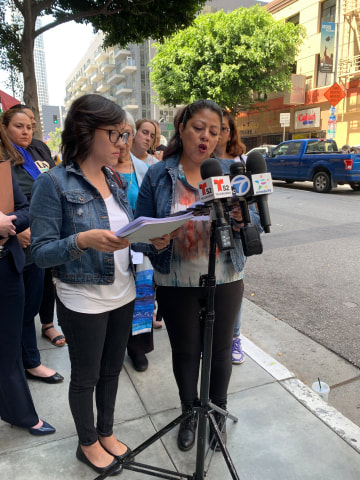|
On October 8, Governor Gavin Newsom signed SB 331 into law. The bill, sponsored by State Senator Connie Leyva, makes it illegal for companies to prohibit employees from speaking about discrimination and harassment.
Previously, laws such as the Stand Together Against Non-Disclosures Act banned non-disclosure agreements (NDAs) in sexual harassment, but did not prohibit NDAs for other types of discrimination, such as race, religion, sexual orientation, and gender identity. Now, California workers will have legal protections for speaking out about all manner of unlawful conduct in the workplace. This legislation has been strongly supported by Ifeoma Ozoma, a Pinterest whistleblower who spoke out about racial discrimination at the company. NDAs are commonly used, particularly in the tech industry, to keep employees quiet about workplace harassment and discrimination for fear of facing legal action and fines. People began discussing them more frequently after it was reported during the #MeToo movement that Harvey Weinstein and other abusers used NDAs to silence their victims. SB 331 was sponsored by the California Employment Lawyers Association (CELA), the organization Earthseed, and Equal Rights Advocates. It will take effect on January 1, 2022. If you believe you have been a victim of discrimination or harassment in the workplace, contact Teukolsky Law today for a free consultation.
0 Comments
LA Country District Attorney George Gascon has issued a statement in support of workers following a suit filed by Teukolsky Law against the legendary Chateau Marmont hotel.
District Attorney Gascón stated: “I am aware of the civil lawsuit and allegations made regarding the Chateau Marmont Hotel. Workers can often feel powerless when dealing with hostile workplaces, dangerous work conditions, and wage theft. I am committed to protecting workers in Los Angeles County.” Gascon’s statement references the lawsuit filed on January 27 by former employee and plaintiff Thomasina Gross. The lawsuit alleges that Ms. Gross, who is African-American, was repeatedly passed over for promotions and work assignments in favor of white candidates and colleagues. The suit also alleges that Ms. Gross faced unwanted touching from guests as she served them, and that management did not help when she attempted to report this conduct. Gascon, who has been in office since December, campaigned on a progressive platform of reforming the DA’s office. His statement follows actress and activist Jane Fonda’s pledge to boycott the Chateau Marmont until it has addressed the workers’ concerns. The Hollywood Reporter wrote an article about Gascon’s statement, which can be found here. If you believe you have experienced racial discrimination or sexual harassment at work, contact Teukolsky Law today for a free consultation.  Teukolsky Law filed a new lawsuit yesterday on on behalf of a female housekeeper at the boutique Freehand Hotel in downtown Los Angeles alleging that she experienced sexual harassment while she cleaned the men’s restrooms located next to the hotel bars. According to the complaint, the hotel's rooftop bar is a “destination for partygoers,” which features loud music and the smell of marijuana smoke. On Friday and Saturday nights, according to the complaint, the bar takes on a “raucous ‘party’ atmosphere” where guests are often visibly intoxicated and stumbling into the bathroom. Plaintiff Edith Gutu is a 44-year old woman who has worked as a housekeeper at the Freehand since March 2018. She frequently cleans the men’s restrooms near the hotel bars on Friday and Saturday nights. She has repeatedly asked management to allow her to close the men’s restroom while she cleans, but they have refused. As a result, Ms. Gutu alleges that she has regularly been exposed to men’s genitals as they use the urinals while she cleans. She also alleges that she feels trapped inside the restroom stall when men enter and start urinating. Ms. Gutu alleges that she has been subject to unwelcome conduct from male guests, including being called a “fucking bitch, fucking Mexican,” or words to that effect, by a male guest she asked to wait outside the restroom until she was done cleaning. Ms. Gutu alleges that she has repeatedly asked Freehand management to let her transfer to the day shift, but they have refused. Even though there are other male staff who could be assigned to clean the men’s restroom, the complaint alleges that Freehand management has not permitted Ms. Gutu to change shifts with them, nor allowed her to close the restroom while she cleans. Instead, after she complained about being exposed to inappropriate guest conduct, management allegedly told her it was “part of [her] job.” Teukolsky Law also represents Leticia Vallejo, a Marriott housekeeper who similarly alleges that she experienced sexual harassment from male guests while she was required to clean the men’s restroom next to a hotel bar. Like the Freehand Hotel, the Marriott allegedly refused to allow Ms. Vallejo to close the men’s restroom while she cleaned. Ms. Vallejo’s lawsuit is pending in Superior Court in Orange County and is in the discovery phase. Under California law, employers have an obligation to protect their employees from sexual harassment by third parties, including customers. If you believe that you have been sexually harassed, contact us today for a free consultation.  Earlier today, Teukolsky Law filed a new sexual harassment lawsuit on behalf of Joey Dalla Betta (pronouns: they/them) against Flaunt Magazine, its CEO Luis Barajas and Editor-in-Chief Matthew Bedard. Barajas founded Los Angeles-based Flaunt in 1998 after a 10-year stint running Detour, a well-known fashion and entertainment magazine. Flaunt covers have featured many high-profile actors and musicians such as Beyoncé, Brad Pitt and Kanye West. Barajas, who is in his mid-50s, hired Dalla Betta as his executive assistant in July 2018. Dalla Betta alleges that Barajas and Bedard ran the magazine based on a culture of fear and intimidation, where advancement was based on a willingness to submit to repeated sexual advances and endure a non-stop barrage of sexual banter. Young aspiring writers like Dalla Betta were scared to complain or quit because jobs in the magazine industry are so rare. (Joey Dalla Betta, pictured left. Photo credit: Lucy-Bleu Knight.) VICE News ran a piece covering the filing of the lawsuit. As described in the piece, "At first, Dalla Betta thought that the expectations and behavior at Flaunt were normal in the journalism industry. They poured themselves into Flaunt, often working through weekends. At times, it felt like even the boundaries between Dalla Betta and the magazine itself had dissolved, because they felt the successes and failures of the magazine so intimately." If you have experienced sexual harassment, contact Teukolsky Law today for a free consultation. CALIFORNIA SENATE BANS EMPLOYERS FROM REQUIRING EMPLOYEES TO GIVE UP THEIR RIGHT TO GO TO COURT8/22/2018 Today, the California Senate voted to approve AB 3080, a bill that would prohibit employers from requiring their employees to arbitrate employment-related claims against their employers. Under current law, employers can require their employees to sign arbitration agreements as a condition of employment. Arbitration is a private court system without judges and juries. Instead, arbitrators -- usually retired judges -- are paid to adjudicate claims. Arbitrations are usually confidential, and held in hotel conference rooms or other private locations. If the bill becomes law, employers in California will no longer be allowed to require employees to give up their right to go to court. Instead, employees will be able to sue their employers in court for discrimination, retaliation, sexual harassment, and a host of other claims that employees can bring under California's Fair Employment and Housing Act, one of the strongest anti-discrimination laws in the country. Employers will also be prohibited from requiring employees to arbitrate wage-and-hour claims under the California Labor Code.
Governor Brown has until September 30 to sign or veto the bill. If he signs AB 3080 into law, it will almost certainly be challenged by employers as contrary to the Federal Arbitration Act, a federal law which expresses a preference for cases to be resolved through private arbitration. Nonetheless, today's Senate vote is a huge win for employees. Many of our clients have no idea that they have signed arbitration agreements giving up their rights to sue their employers in court. Forced arbitration agreements are contrary to American values, and should be ended. Teukolsky Law client Sandra Pezqueda has settled a sexual harassment case against Terranea Resort and the staffing agency that placed her there for $250,000. The settlement has drawn national attention because TIME Magazine named Ms. Pezequeda a "Person of the Year" in 2017 as one of the Silence Breakers who spoke out against sexual harassment. TIME honored Ms. Pezqueda alongside celebrities like Ashley Judd and Taylor Swift. The settlement has received extensive coverage, including from The Washington Post, TIME Magazine, CBS and The Daily Mail. Interest in Ms. Pezqueda's settlement comes at a time when many states, including California, are considering legislation that would benefit victims of sexual harassment, such as prohibiting non-disclosure agreements in sexual harassment settlements.
|
AuthorLauren Teukolsky is the founder and owner of Teukolsky Law, A Professional Corporation. Archives
June 2024
Categories
All
|
Teukolsky Law, A Professional Corporation, represents clients throughout California. Ms. Teukolsky is admitted to practice in the State of California, as well as the United States Supreme Court, Ninth Circuit Court of Appeals, Northern District of California and Central District of California. Disclaimer.
Copyright © 2017
Copyright © 2017


 RSS Feed
RSS Feed